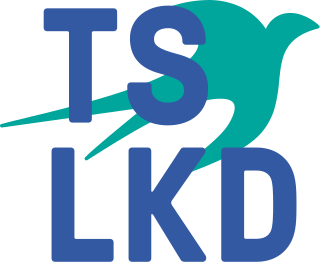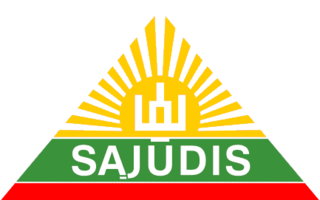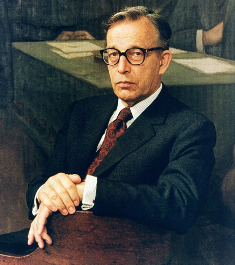
Politics of Lithuania takes place in a framework of a unitary semi-presidential representative democratic republic, whereby the president of Lithuania is the head of state and the prime minister of Lithuania is the head of government, and of a multi-party system.

Algirdas Mykolas Brazauskas was a Lithuanian politician who served as the fourth president of Lithuania from 1993 to 1998. He also served as the prime minister of Lithuania from 2001 to 2006. Brazauskas was the first democratically elected president of post-Soviet Lithuania.
The Social Democratic Party of Lithuania is a centre-left and social democratic political party in Lithuania. Founded as an underground Marxist organisation in 1896, it is the oldest extant party in Lithuania. During the time of the Soviet Union, the party went into exile, emerging once again after the end of communist rule in 1989.

The New Union (Social Liberals) (Lithuanian: Naujoji sąjunga (socialliberalai), NS) was a social-liberal political party in Lithuania. The NS was a member of the European Liberal Democrat and Reform Party (ELDR) and an observer of the Liberal International. It was founded in 1998 and is led by Artūras Paulauskas.

The Homeland Union – Lithuanian Christian Democrats, also colloquially known as the Conservatives, is a centre-right political party in Lithuania. It has 18,000 members and 28 of 141 seats in the Seimas. Its current interim leader is Radvilė Morkūnaitė-Mikulėnienė following the resignation of Gabrielius Landsbergis in 2024 after the party's loss in the election. It is a member of the European People's Party (EPP).

The Democratic Labour Party of Lithuania was a political party in Lithuania. It was the successor of the Soviet-era Communist Party of Lithuania. The youth organization of LDDP was called Lithuanian Labourist Youth Union.

Elections in Lithuania are held to select members of the parliament, the president, members of the municipal councils and mayors, as well as delegates to the European Parliament. Lithuanian citizens can also vote in mandatory or consultative referendums.

The Sąjūdis, initially known as the Reform Movement of Lithuania, is a political organisation which led the struggle for Lithuanian independence in the late 1980s and early 1990s. It was established on 3 June 1988 as the first opposition party in Soviet Lithuania, and was led by Vytautas Landsbergis. Its goal was to seek the return of independent status for Lithuania.

Stasys LozoraitisJr. was a Lithuanian diplomat and politician who served as the Head of the Lithuanian Diplomatic Service from 1987 to 1991, Chief Diplomat to the United States 1991 to 1993 and Ambassador to Italy 1993 to 1994. He was a son of the famous diplomat Stasys Lozoraitis (1898–1983) and brother of Kazys Lozoraitis.

Parliamentary elections were held in Lithuania on 10 October 2004, with a second round on 24 October 2004 in the constituencies where no candidate won a majority in the first round of voting. All 141 seats in the Seimas were up for election; 71 in single-seat constituencies elected by majority vote and the remaining 70 in a nationwide constituency based on proportional representation.

Presidential elections were held in Lithuania on 22 December 2002 and 5 January 2003. Incumbent President Valdas Adamkus ran for reelection alongside sixteen other candidates, the largest field of presidential candidates in the country's history. Though Adamkus held a large lead over his closest opponent, Rolandas Paksas of the Liberal Democratic Party (LDP), in the first round of the election, Paksas defeated Adamkus in the second round with 54.71% of the vote.
Supreme Soviet elections were held in the Lithuanian SSR on 24 February with run-off elections on 4, 7, 8 and 10 March 1990 to elect the 141 members of the Supreme Soviet. In six constituencies, voter turnout was below the required minimum and a third round was held on 17 and 21 April. For the first time since 1940 elections to the People's Seimas, non-communist candidates were allowed to run. The elections were the first free nationwide elections since 1926, and only the fifth free elections in all of Lithuanian history.

Romualdas Ozolas [rɔmʊˈɐɫdɐs ˈoːzɔɫɐs] was a Lithuanian politician, activist, writer and pedagogue who taught at Vilnius University. He was of Latvian descent on his father's side.

Parliamentary elections were held in Lithuania in two stages on 25 October and 15 November 1992. A total of 141 members were elected to the Seimas, which replaced the Supreme Council; 70 were elected using proportional representation and 71 from single-member constituencies. Where no candidate in the single-member constituecies received more than 50% of the vote on 25 October, a run-off was held on 15 November. The first round of the elections were held simultaneously with a referendum on the adoption of a new constitution.

Parliamentary elections were held in Lithuania in two stages on 20 October and 10 November 1996. All 141 seats in the Seimas were up for election; 70 based on proportional party lists and 71 in single member constituencies. Where no candidate gained more than 50% of the vote on 20 October, a run-off was held on 10 November.
The Lithuanian Liberty League or LLL was a dissident organization in the Lithuanian Soviet Socialist Republic and a political party in independent Republic of Lithuania. Established as an underground resistance group in 1978, LLL was headed by Antanas Terleckas. Pro-independence LLL published anti-Soviet literature and organized protest rallies. While it enjoyed limited popularity in 1987–1989, it grew increasingly irrelevant after the independence declaration in 1990. It registered as a political party in November 1995 and participated in parliamentary elections without gaining any seats in the Seimas.

Presidential elections were held in Lithuania in December 1997 and January 1998. Artūras Paulauskas finished first in the first round on 21 December 1997 with a significant margin, with Valdas Adamkus finishing second, but neither received a majority of the vote. Adamkus defeated Paulauskas in the runoff, held on 4 January 1998. With a vote difference of 0.74%, it is the closest result in the history of presidential elections in Lithuania since 1993.

The Sixth Seimas of Lithuania was the first parliament (Seimas) elected in Lithuania after it restored independence on 11 March 1990. Elections took place on 25 October 1992, with the second round on 15 November. In a surprisingly decisive outcome, the elections were won by Democratic Labour Party of Lithuania (LDDP), with 73 seats. The result reflected widespread dissatisfaction with the economic situation and the policies of the ruling Sąjūdis political movement in the preceding Supreme Council of Lithuania.
Lubys Cabinet was the 5th cabinet of Lithuania since 1990. It consisted of the Prime Minister and 17 government ministers.

The Lithuanian Regions Party, also translated as the Lithuanian Party of Regions, is a political party in Lithuania. It was founded in 2018 as the Social Democratic Labour Party of Lithuania following a split of members from Social Democratic Party of Lithuania after the LSDP's decision to exit a coalition government with the Lithuanian Farmers and Greens Union in 2017.














